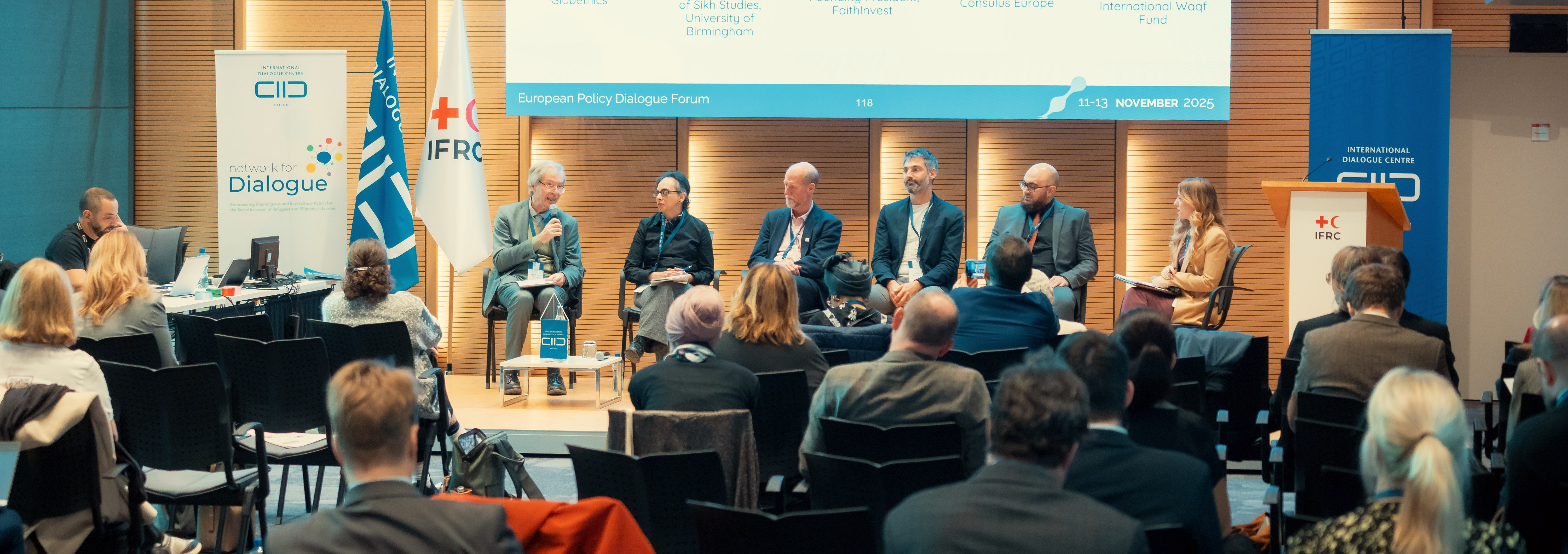Ethical Investment in a Time of Global Upheaval: Key Insights from the 6th European Policy Dialogue Forum
Dietrich Werner, Globethics President
13 November 2025

At the 6th European Policy Dialogue Forum of the International Dialogue Centre (KAICIID), held from 11–13 November 2025, Globethics President Dr Dietrich Werner joined a timely panel reflecting on the future of ethical investment. Speaking within the broader conference theme “Social Cohesion in Changing Climates: Fostering Inclusive Paths to Equity in Europe,” Werner and fellow thought leaders explored a central question: (how) can ethical investments truly change the world?
The data shows both promise and paradox. Ethical and sustainable assets have surged globally—to an estimated USD 30 trillion—growing by more than a third in just two years. Europe in particular stands out, hosting 85% of the world’s sustainable net assets and integrating sustainability into nearly 40% of total assets under management. Yet these impressive milestones are set against a sobering backdrop: the world still needs an estimated USD 6.2 trillion of climate finance annually between now and 2030, and USD 7.3 trillion by 2050, to deliver Net Zero – a total of almost USD 200 trillion. Progress, as Werner noted, is real—but far from sufficient.
The Moral Foundations of Ethical Investment
For ethical investment to remain credible and effective, Werner emphasised the need for a shared moral foundation. Ethical investing is only possible when society can agree on what constitutes ethical behaviour: an agreement rooted variously in philosophy, tradition, intuition, and religious values. Historically, such shared values have guided investment choices, from the divestment from gambling or tobacco by 18th-century Methodists and Quakers, to the post-2015 consensus on moving away from fossil fuels.
But today, this moral consensus is under strain. Climate denial, political polarisation, and competing economic pressures have weakened shared commitments to climate justice, human dignity, and the protection of vulnerable communities. Ethical investment requires constant reaffirmation and renewal of these values, and, Werner argued, faith communities have a unique role in preserving and strengthening this moral fabric.
Standards, Transparency, and the Fight Against Greenwashing
“Bringing money and values together,” Werner explained, demands more than good intentions. It requires clear standards, transparent guidelines, and rigorous assessment tools. Across Europe, church-related committees, civil society organizations, and platforms such as Faire Fonds perform the essential task of scrutinising ESG claims. This need has grown urgent: 674 ESG funds in Europe recently changed their names to avoid stricter exclusions on fossil fuels—an indicator of the ongoing risk of greenwashing.
This is why education, ethical leadership training, and public literacy on tools such as the EU Taxonomy and Corporate Sustainability Reporting Directive remain essential. Globethics continues to invest in this educational ecosystem, connecting experts, producing guidance, and nurturing the skills needed to evaluate real-world ESG performance.
Headwinds: Militarisation, Market Volatility, and the Crisis of Credibility
Despite two decades of growth, ethical investments are experiencing a slowdown. Withdrawals from ESG funds are rising, and macroeconomic forces—from geopolitical conflict to the unprecedented rise in military spending—are overshadowing sustainability commitments. Global military expenditure has surged to historic highs, projected to reach USD 6.6 trillion by 2035, while humanitarian aid and development budgets face steep cuts. These trends pose deep dilemmas for investors, particularly as debates intensify over whether investments in defensive technologies—such as drone systems used for national protection—can be ethically justified.
This shifting landscape risks diluting the clarity of ESG standards. Werner therefore called for a renewed integration of peace-building into ESG criteria, ensuring ethical investment remains anchored not only in environmental and social goals, but also in non-violence, human security, and conflict prevention.
Strengthening the Ethical Investment Movement
Werner outlined five strategic actions to safeguard the distinct profile of ethical investment: broaden ESG to include peace, strengthen international advisory platforms, balance positive investment with divestment and shareholder engagement, scale up asset development in religious communities, and expand multi-religious collaborative investment projects.
Ethical Investment as a Collective Commitment
Ultimately, Werner expressed confidence: ethical investments can change the world—when supported by communities and actors with conviction, resilience, and the capacity to mobilise resources across sectors and borders.
Individuals, organisations, and civil society institutions all hold moral influence, expertise, and assets that, if strategically aligned with ethical investment principles, can become powerful levers for justice, peace, and sustainability. Ethical investment, he concluded, is not only a financial strategy but a collective moral commitment—one that, when pursued with clarity and determination, can help shape a more equitable and sustainable world.
Read the EPDF Call to Action, including the call to "Foster innovative and ethical investment, encouraging ethical, values-based institutions and investors to support community initiatives for the common good by leveraging the significant results already achieved by pioneers in this area."